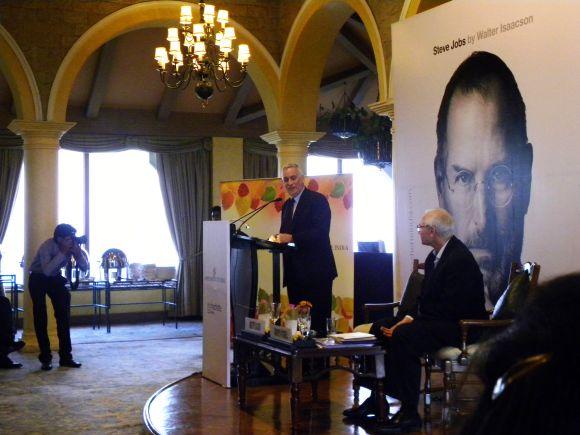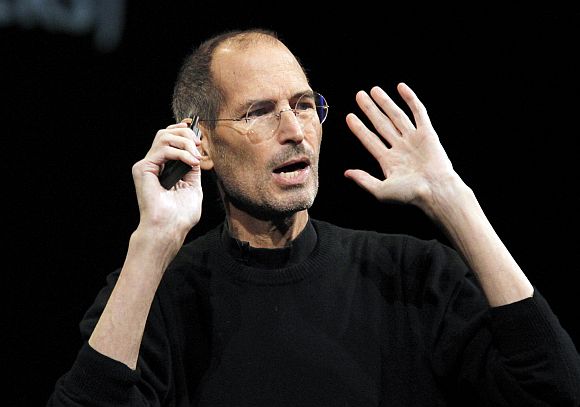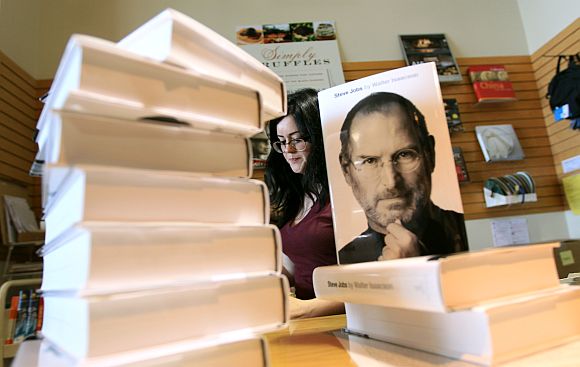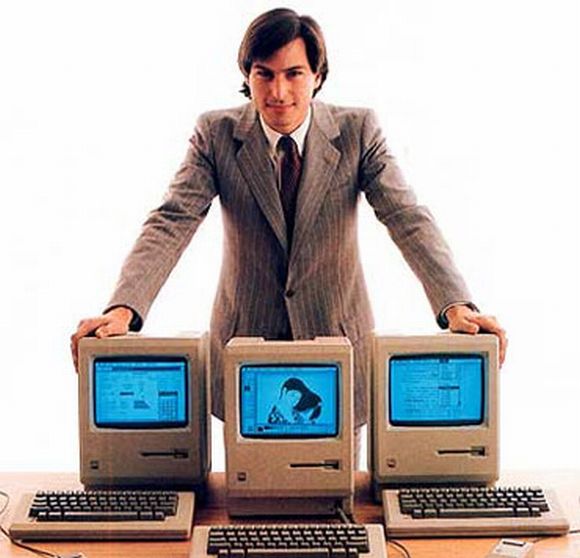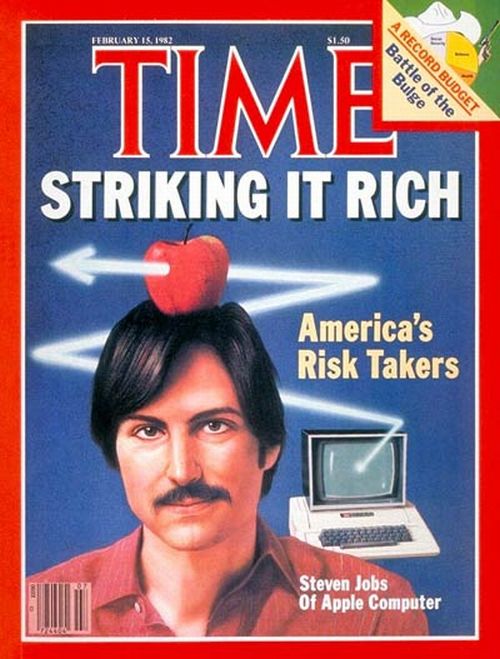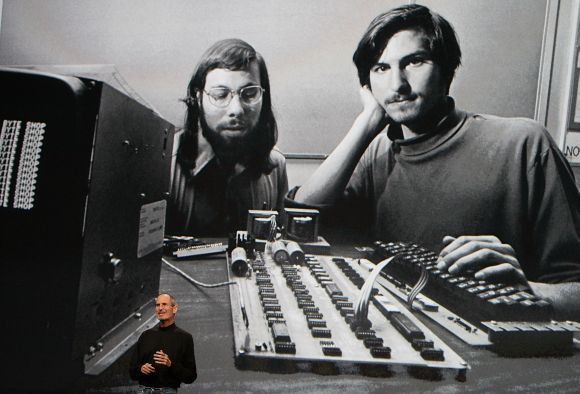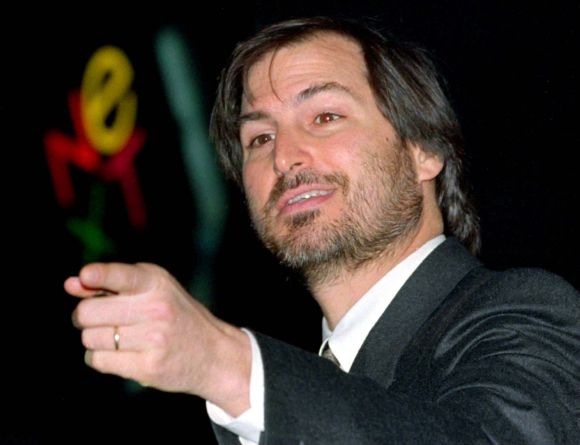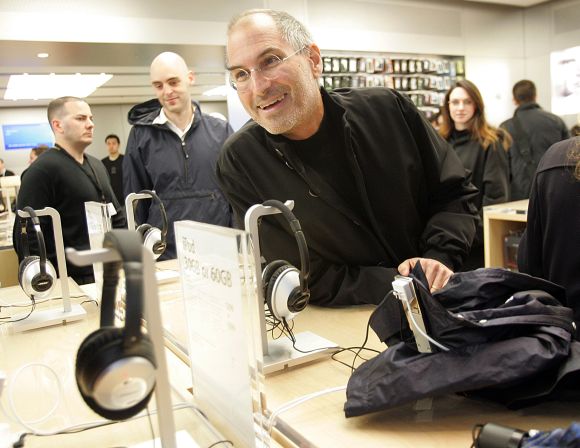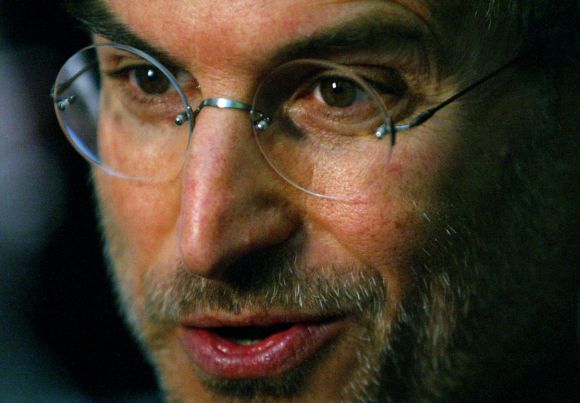 | « Back to article | Print this article |
'Steve Jobs learnt a lot from India'
Walter Isaacson, Steve Jobs' biographer, reveals his most memorable interactions with the Apple founder and international legend, in a fascinating chat with Rediff.com's Vaihayasi Pande Daniel.
Walter Isaacson, former editor Time magazine, and erstwhile CEO, CNN, and Steve Jobs' chosen biographer, has been to India many times before.
Isaacson, now head of The Aspen Institute, an educational and policy study think-tank, based in Washington, DC, was in New Delhi at the invitation of its partner organisation, the Aspen Institute India, for a lecture series.
While he was in the national capital, he also delivered a special lecture on Steve Jobs last week. Steve Jobs, his authorised biography, is a runaway international bestseller.
In Isaacson's interview to Rediff.com's Vaihayasi Pande Daniel, and later his lecture to Aspen delegates, he touched on his most memorable interactions with the Apple founder, and revealed what made Jobs so successful.
As Isaacson spoke, in a mellow American southern accent, he referred to his meticulously collated notes, memories and special insights on Jobs. He interviewed the very private, austere, Jobs 40 times over two years and met over a hundred people to write this incredible life story. The first of a two-part feature.
Please click on NEXT for more...
'Jobs and India have the ability to combine beauty with technology'
Do you know how popular Steve Jobs is in India?
Tell me.
At any street corner book stall, in India's largest metros, you will see books on him selling -- some of them are copies of your book -- selling illegally or legally and that is a fair indication of his popularity.
He seems to have caught the Indian imagination. Were you aware of that?
(Smiles) No...
When you were profiling him -- everyone knows about how he came to India in his early years -- but was he in touch with Indians/India in his later life?
Not really, but he was very moved by the spiritual awakening that he had in India and I think he learned a lot from India.
In what sense?
He learned the value of simplicity, focus. I think he became an adherent of Eastern religions and Buddhism. And I think that affected his design sensibility throughout his life, because he always cared about simplicity being at the heart of great design.
Do you see, some of what he saw, in India, on your trips here?
Well, I see that India has the ability to do what Steve Jobs did, which is combine beauty with technology, to combine the arts and the sciences.
What are your impressions of India?
I think India is a very entrepreneurial country, that believes in the free flow of information, the free flow of ideas and that will serve it well in the 21st century when there will be an Information Age economy.
I would always love to bet on a country like India, where most of the young people are trying to develop Google and Facebook apps, than on a country that is trying to censor Google and Facebook apps.
India will be the country that will not censor Google and Facebook apps?
Yes, India will be better positioned for the future because every young person here seems to dream of creating Facebook and Google apps. Other countries won't be successful because they are trying to censor Google and Facebook apps.
Please click NEXT to read more...
'There were two sides of Steve Jobs'
In your biography on Steve Jobs, you have not flattered him too much. You have also stressed on his business sense too.
Was that something you consciously worked towards?
I think there were two sides to Steve Jobs. His sort of romantic, counter-culture side. But also his hard-core, business and technology side. And both those played into who Steve was.
Why did you decide to pick him as the subject of a biography?
He had been talking to me for many years about possibly doing a biography.
I realised that he was the American creation myth writ large. Somebody who had started a company in his parents' garage, made it the most valuable company on earth.
And he was willing to share that with me and so it was a chance to celebrate someone who was a business person, an entrepreneur, an inventor, an innovator. And those are the types of people we need to celebrate in the 21st century.
Do you see a lot of entrepreneurs in India and China?
India, in particular.
We spent the morning with people who are part of the Aspen Institute India's Leadership Initiative and almost all of them are great entrepreneurs, starting businesses. Or social entrepreneurs, trying to start services that can help people.
You see the entrepreneurial spirit in India and that was one of the reasons I came here. Because I wanted to see and meet with the India Leadership Young Leaders group, that is part of the Aspen Institute India's programme.
Is there any reason you feel why India -- a country quite different from America -- has encouraged entrepreneurs to come up, whether it is that fellow at the corner of the street, who is selling your book, a pirated version maybe?
India has a tradition, that is centuries old, of being shopkeepers and traders, of trading. But I also think that India as a society is comfortable with the free flow of ideas. There is a lot of free press -- lots of television stations and newspapers.
And it is comfortable with tolerating and respecting people of different ethnic backgrounds. And that adds to creativity as well. And those are two qualities that the world is going to need in the 21st century.
You see that a lot in India, you see that a lot in America... and where else do you see that?
There are some Asian countries, even ones you wouldn't expect, like Vietnam, that are very entrepreneurial.
Certainly parts of the United States are that way. But I think India is very comfortable with technology, very comfortable with free speech, very comfortable with respecting people of different backgrounds and that makes it share many of the same values as the United States and among those is celebrating people who can invent their own businesses.
You succeeded in not making a hero out of Jobs in your book. Was that a conscious effort?
He told me that that he was always honest, in fact sometimes brutally honest. He would tell people exactly what he thought. And he wanted a book, he said, that was honest.
Steve had enormous amounts of talent and genius. But he also had human flaws. And if you are going to write a true book, you have to show that his very intense personality was reflected in his passion for making good products, but also in an impatience and sometimes an unkindness. That's just who he was.
When I asked him about it, he said that's just who I am and you are going to have to write a book about who I am, you know.
It would have been easy to write a book that was more hero-worshipping, but I thought it was more honest to write a book, that gave all sides of him and let people understand that he was human.
That he was human just like the rest of us, but he could still be very innovative and a great genius so that is what I respected about him.
(Steve Jobs requested his friends and colleagues to speak candidly about him to Walter Isaacson and exercised no control over the material that went into the book, except the cover. Nor did he wish to read it before it was published on October 24, 2011.
He died 19 days before the book was in stores, October 5. The purpose of the biography, Jobs had said, was for his daughters and son to know their dad.)
Why do you think he catches India's imagination?
I think India is trying to create a new generation of Steve Jobses.
People who create new companies, create new products.
India, especially young people in India, respect the notion of being innovative and imaginative and they know he also had a sense of beauty, a sense of art and he connected all that together.
And I think that resonates within the souls of people in India who dream of being creative, imaginative, of connecting beauty to technology.
Please click NEXT to read more...
'His passion and intensity reflected in impatience and a real roughness'
On his first meeting with Steve Jobs:
I started writing this book (titled Steve Jobs) when I got a phone call from Steve Jobs right after I came to The Aspen Institute.
I had known Steve for quite a while (when) I had been at Time magazine and at CNN.
I first met him in 1984, when he came by Time magazine to show off this new computer, the computer that felt like an appliance, a beautiful device called the Macintosh.
If you have the book, and you look on the back cover of the book, on the back jacket, there he is sitting in the lotus position, which he learnt in India, holding and cradling the Mac from 1984.
I was about the only writer at Time magazine (New Orleans-born Isaacson began his career, after earning a degree at Harvard, and doing a stint as a Rhodes scholar at Oxford, at The Sunday Times, London. He joined Time as a political correspondent in 1978) who used a computer.
So all the old editors at Time, who were meeting with Steve Jobs, made me come up (because they had to have somebody there who knew what a computer actually was) and I remember being totally blown away, totally impressed by Steve Jobs.
First of all, he had a passion for his product. A passion for the beauty of it. And the perfection of it. He made us look at how wonderfully shaped the case was, how sealed like an appliance it was, each curve on it, how the disc drive at the bottom was slightly off centre, so it looked like a human face with a little bit of a smile and the icon on the screen. He made us use a jeweller's loupe (eye) to look at each of the pixels and see how beautiful they were.
But I also saw that, that passion and intensity of Steve Jobs was reflected in sort of an impatience and a real roughness to his character, because partly through the meeting he informed all of us at Time magazine that our magazine was not nearly as good as Newsweek, that they understood things much better than we did.
And that our magazine -- to use a phrase that he sometimes used... well I won't use that phrase -- but it was a somewhat shocking phrase to some of my older colleagues in my editorial team. And (he felt that way about Time) because he thought we were going to make him Man of the Year, the year before and when we hadn't made him Man of the Year he was quite upset (with Time).
So I saw that sort intensity that was translated into a passion for his products but also into an impatience, and a petulance.
Please click NEXT to read more...
'Why don't you do my biography next!?'
On being asked to write Jobs' biography
Over the years I knew Steve Jobs moderately well. When I became editor of Time magazine (Isaacson became Time's 14th editor in 1996), and then the head of CNN (in 2001), he was actually my best friend, two days a year, whenever he got a new product out.
He would come and show it and tell us why it should be on the cover of Time magazine or featured on CNN.
So after I came to The Aspen Institute early in 2004, he gave me call. I said 'Why don't you speak at the institute?'
He said, 'Well, I'll come, but I don't want to speak, but I want to take a walk with you.' I did not know that taking a walk was Steve's way of having a meeting.
I had written a biography of Benjamin Franklin. I was just about to publish a biography of Albert Einstein. So Steve said to me: 'Why don't you do my biography next?'
I must admit my first reaction was: Benjamin Franklin, Albert Einstein and you? The humility that you showed back in 1984 is still intact? So I said, 'Yes, I would love to, but let's wait 20 or 30 years until you retire.'
Eventually his wife (Laurene Powell Jobs) said to me 'If you are going to do a biography of Steve, you have to do it now.'
I said 'Well, I did not know that he had cancer when he called me. I did not know he was sick.'
His wife said, 'Well, nobody knew. He was keeping it a complete secret, but he called you the day before he was about to be operated on.'
Please click NEXT to read more...
'He was a great restoration drama'
I realised that here is a guy facing mortality. I thought about his place in history. He was somebody, it occurred to me, who really represented the entrepreneurial creation myth, writ large.
Somebody who had started a company in his parents' garage, with a chubby kid from down the street. And turned it into the most valuable company on the planet.
Secondly, he was a great restoration drama, for those of us who like narrative story arcs. A guy gets kicked out of his own company in 1985 and year after Mac was created. Gets kicked out of his own company, but 12 years later they have to bring him back because the company is going bankrupt. And he saves the company.
And also he had basically he transformed a dozen industries, starting with the home computer industry. That Macintosh, I mentioned is on the back of the book, was the first computer that said: 'Oh you can bring me home. This is not just for the Pentagon or for a big corporation. These are home computers. Personal computers. Ones you can use.'
He also transformed the music industry, the publishing industry, the cell phone industry, the retail store industry, the digital movie and animation industry.
All of these were transformed by that passion for products, that I saw, when I first met Steve.
So I said, 'Sure I would be very interested in doing this.'
Please click NEXT to read more...
'Steve learned in the villages of India the importance of intuition'
Steve Jobs on his year in India:
We talked about the various things that made his life what it was.
He told me he had travelled to India when he was a dropout from college. Drops out, comes here for almost a year, wandering around penniless looking for spiritual enlightenment, living in the villages of India.
I asked him what he learned here.
He said first of all, the value of intuition. Where I grew up, we believed in Western rational thought, empirical thinking. But I learned in the villages of India the importance of intuition, of experiential wisdom, of focusing.
And understanding the simplicity that comes from that experiential wisdom; that intuition that you have.
Secondly, he talked about the importance of connecting beauty to science. He said he really learned the importance of art and beauty and style and design and how they connected to engineering, technology, business, in the creation of products.
That, to me, was the main thing that underlined Steve's great passion for the products he made.
Please click NEXT to read more...
'You are going to care even about the parts unseen'
On how he strived to be a true artist:
I first saw him describe that passion for products, which I think is his most salient trait, when he talked about being a young kid.
We walked around the neighbourhood where he grew up (in Los Altos, California with his adoptive parents Paul and Clara Jobs). We walked around the house (where he lived) when he was five, six, seven, eight years old.
He said when I was a young kid we built this fence. And he made me look at the fence around the house. He made me go to the back of the fence.
'My father told me that we had to make the back of the fence just as beautiful as the front of the fence.'
And Steve said: 'Why? Nobody will ever see it. Nobody will ever know.'
His father said: 'Yes, but you will know.'
And Steve said that was the first lesson I had in the importance of making a great product. (It) was that if you care about putting everything together and integrating it so that it is a perfect product, if you have that true artistic sensibility, then you are going to care even about the parts that are unseen.
He said his father, who was just a dropout, an auto mechanic, dropped out of high school, when you are a craftsman and make a great chest of drawers you don't put a cheap piece of wood on the back, facing the wall, even though nobody will ever see it.
If you are a true craftsman, you would put a good piece of wood there, because that shows that you are a true artist.
Please click NEXT to read more...
'Real artists sign their work'
On Jobs' passion for the perfection of a product:
When they were building that first Macintosh, Steve sort of loved everything about it -- as I said the sealed case, how beautiful it was.
But right as they were getting near the end, Steve looked at the circuit board. He said to the engineers making the circuit board: 'This is ugly. This stinks!' (Actually he used a stronger word than stinks!)
They said: 'What do you mean?'
He said: 'Well you know, the chips aren't lined up,' with an angry face.
But they said: 'Steve, you have this in a sealed appliance.'
'Nobody can open up the case. Nobody will ever see it. Nobody will ever know.'
Steve said what his father had said to him: 'Yes, but you will know...'
So they held up shipping the original Macintosh, until they perfected that circuit board and made it beautiful, made it so all the chips were spaced equally.
And when they did, Steve had all 32 engineers on the Macintosh team sign a white board, with their names, with steven p jobs, all in lower case, signed right in the middle, so that they could engrave the names on the inside of that Macintosh case.
What he said to them was: 'Real artists sign their work. Real artists take a passion for products.'
Those of you in business know that you have two real ways of approaching a business. One is to have a passion for the product, making the product insanely great, to use Steve's words.
Another way is to have a passion for making a profit.
They are both valid ways. But Steve said, if you have a passion mainly for making a profit, you will end up cutting corners on the product.
You will make it a little bit cheaper, a little bit easier and eventually you won't have a really great product and you will just be a commodity like everyone else.
But if you have a passion for the product and you do everything you can to make it a beautiful product you are proud of, eventually the profits will follow.
And over and over again Steve had that wonderful passion, for even the parts unseen, making them as perfect as possible.
Please click NEXT to read more...
'After a year in India, wearing saffron robes, he walked into Atari and demanded a job'
On the mystical persona Jobs adopted after studying Eastern religions:
Part of that passion translated into, what some of the people who worked with him called, a reality distortion field. Not sure they always meant it as a compliment.
Some of you may know it is a phrase from an early Star Trek episode, where the aliens when they want to conjure up a galaxy, do it through sheer force of will.
They make something happen that seems impossible, simply by willing it to be so.
And Steve sometimes was able to do that.
His first partner, the kid from down the street, I mentioned, was Steve Wozniak. Early on, before they started a company together, they worked on the night shift at Atari (as employee number 40). Actually Steve Jobs was the one who had the main job on the night shift of Atari, which was a video game maker.
And the reason he worked, by the way, on the night shift at Atari is he had gotten the job right when he had come back from India, after spending almost a year in India. Wearing his saffron robes, he walked into the lobby of Atari and demands a job.
As Al Alcorn, the chief engineer of Atari, explained it to me. He said, 'Having come back from India, and having met his guru, Steve had become a strict vegan. He only ate fruits and vegetables. He believed that if you kept to such a diet, you actually did not need to shower often or use deodorant.'
Al Alcorn looked at me and said: 'That was a mistake in theory.'
Anyway Steve was a strong personality, with an even stronger... whatever, gets put on the night shift, and they are creating video games.
One of the games that Al Acorn wanted was a one-player game called Break Out.
Steve Jobs says to Wozniak: 'You have design this and do the engineering, do the software for it in four days.'
And Woz says: 'No, no, it is actually a pretty complicated bit of coding. It will take me about three weeks.'
And Steve said: 'No, no, you have to do it in four days. We have to get back to the apple commune, the farm they were working on (and eventually the name of the company they founded). The harvest was coming along and Jobs said, 'You got to do it in four days.' And Woz keeps protesting.
Steve had learned, at an early age, as he was studying Eastern religions and trying to make himself mystical, how to stare without blinking. And Woz said: 'He just sat right across from me and stared without blinking. And said, 'Don't be afraid, you can do it.'
Wozniak said: 'So I went back to my little desk and I stayed up four nights in a row and I was able to cover the entire Break Out game.'
That's an example of Steve Jobs' reality distortion field which drove people crazy and drove them to distraction, but also drove them to do things they thought were impossible.
